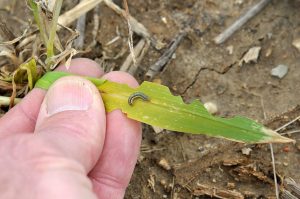We have had major flights of armyworm moths (Figure 1.), as evidenced by pheromone trap catches. Catches have been highest in the northeastern portion of the state. Armyworms prefer grasses but will feed on other crops if necessary. During outbreak years, the infestation usually will start in pastures or other grassy areas. Once the armyworms have consumed most of the available leaf tissue, the larvae will march as a group (hence the name) looking for something else to eat. The next crop consumed may be wheat or early corn. When populations are heavy, the damage can be devastating.
Fortunately, these kinds of outbreaks occur quite rarely. The last major outbreak we experienced was in 2001. If you have early-planted sweet corn, it would be wise to watch grassy areas for armyworm damage. If you see evidence of a problem there, watch your sweet corn for any signs of activity. The pyrethroid insecticides provide effective, inexpensive control of armyworm.
